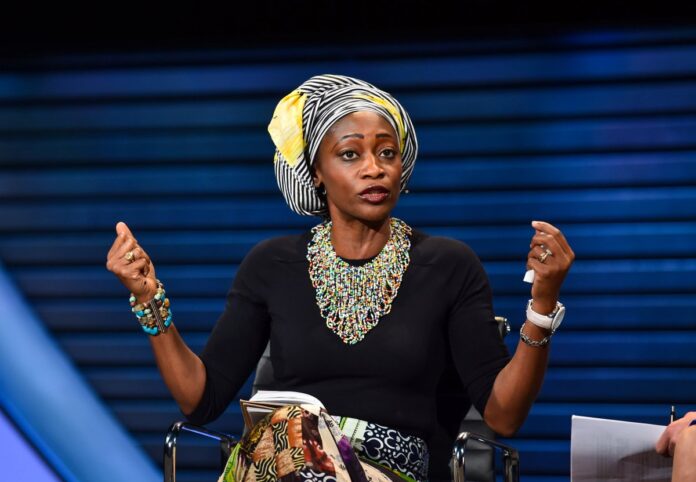Hafsat Abiola-Costello, daughter of the late Chief MKO Abiola, has sharply rebuffed former Nigerian military leader General Ibrahim Babangida’s recent public admission that her father won the annulled June 12, 1993 presidential election. Hafsat stated that while the confession may bring some closure to a long-standing debate, it cannot erase the profound injustice and suffering her family and Nigerians endured as a result of the election’s cancellation.
The 83-year-old ex-ruler, widely known for his controversial annulment of the historic election, made the disclosure at the launch of his autobiography, A Journey in Service, in Abuja on Thursday, February 20, 2025. The book’s release offered Babangida the first opportunity to openly express his regret over the annulment of the election, widely regarded as Nigeria’s freest and fairest.
Gen. Babangida, who ruled Nigeria from 1985 until 1993, acknowledged the severe political and social turmoil his regime caused by halting the transition to civilian rule. This included the imprisonment of MKO Abiola, the supposed winner, and the eventual assassination of his wife, Kudirat Abiola, who was an outspoken advocate for democracy.
However, Hafsat Abiola-Costello, who has carried the heavy mantle of her father’s legacy, reminded Nigerians that the long years of pain, sacrifice, and struggle for democracy cannot simply be erased by a public confession from the former leader.
In her statement released on February 21, 2025, Hafsat stressed that the significance of June 12 goes beyond her personal grief or the fate of her parents; it is about the collective dreams and hopes of the Nigerian people for a better future, which were dashed by Babangida’s decision to annul the results. She emphasized that MKO and Kudirat Abiola’s roles were critical in the fight for democracy, and that her mother’s assassination remains one of the darkest chapters in Nigeria’s quest for democratic freedom.
“When anyone mentions June 12, my mind always goes to MKO and Kudi,” Hafsat said in the statement. “But June 12’s staying power was because the vote that Nigerians expressed that day was a vote for a better future and for unity. MKO may have been the symbol of the Hope ‘93 campaign, but June 12 was about more than one man—it was about the promise of Nigeria that would deliver for Nigerians.”
Hafsat’s remarks come at a time when public discourse around the June 12 election has resurfaced, particularly after the release of Babangida’s memoir, which offers his reflections on the event and the political era that followed. For many, the annulment of the election marked a painful chapter in Nigeria’s post-independence history, one that prolonged the country’s military rule and stunted its democratic growth.
The June 12 election was widely seen as a watershed moment, with millions of Nigerians casting their votes for the candidate they believed would bring the country lasting peace and prosperity. MKO Abiola, a wealthy businessman and philanthropist, emerged as the undisputed winner of the election, which was hailed as a clear, free, and fair contest. But just two weeks after the results were announced, Babangida’s government declared the election null and void, sparking protests, riots, and political instability across the country.
MKO Abiola was eventually imprisoned under the regime of the then-military head of state, Sani Abacha. Despite being denied his rightful presidency, he continued to be a figurehead for pro-democracy movements until his death under suspicious circumstances in 1998. His wife, Kudirat Abiola, who had fiercely campaigned for her husband’s release and the restoration of democracy, was assassinated in 1996 in a drive-by shooting by suspected government agents.
The annulment of the June 12 election is often described as a pivotal moment in Nigeria’s democratic history, marking a period of deep disillusionment and distrust in the country’s military leaders. Despite the eventual return to civilian rule in 1999, the aftermath of June 12 lingers in the hearts of many Nigerians, with the injustice done to MKO Abiola and his family remaining a painful reminder of the struggles faced by those who fought for democracy.
While the Nigerian government officially declared June 12 as Democracy Day in 2018, recognizing its significance in the fight for democratic freedom, Hafsat Abiola believes that the full recognition and respect for her family’s sacrifices still eludes Nigeria.
For Hafsat, Babangida’s confession, though appreciated, cannot undo the irreversible harm done to her family, nor does it absolve the broader injustice suffered by Nigerians who were denied their chosen leader. “It’s sad that such a galvanizing statement as the breakthrough vote for MKO should have been truncated by an unjust annulment,” she wrote. “But I will be forever grateful to both MKO and Kudi for not allowing their fears for their personal safety to stand in the way of the people’s desire for a better Nigeria.”
Hafsat’s reflections echo the sentiment of many Nigerians who continue to mourn the loss of MKO Abiola’s potential presidency. In a nation where political instability and military coups have long been the norm, June 12 remains a symbol of hope unfulfilled—an enduring reminder of the fragility of democratic aspirations in a country that has faced numerous setbacks in its quest for true democracy.
The former military leader’s regret, however, marks an important step in acknowledging the wrongs of the past. Gen. Babangida’s apology, while accepted by some, remains too little too late for many, especially for those whose lives were irreversibly changed by the annulment and the events that followed.
As Hafsat Abiola said, “May such commitment endure,” referring to the sacrifices made by her parents and others who contributed to Nigeria’s pro-democracy movements. But for many Nigerians, the wounds of June 12 have not yet healed, and no amount of regret can ever fully restore the hopes of that fateful day.

